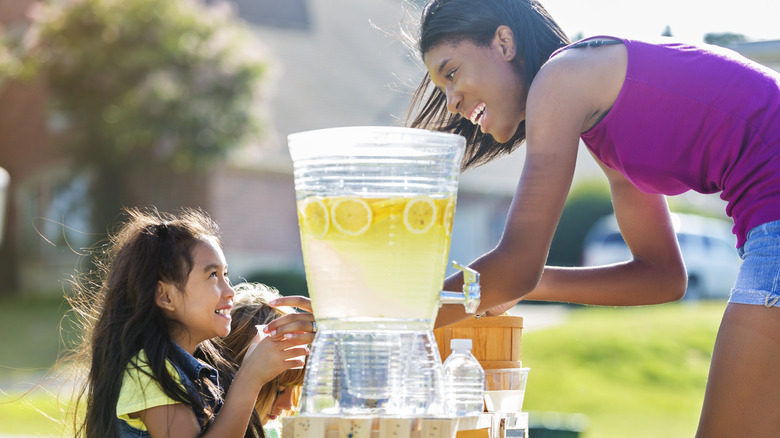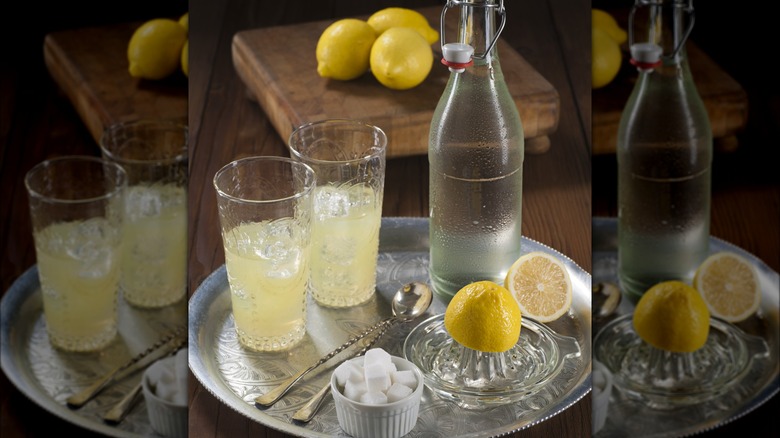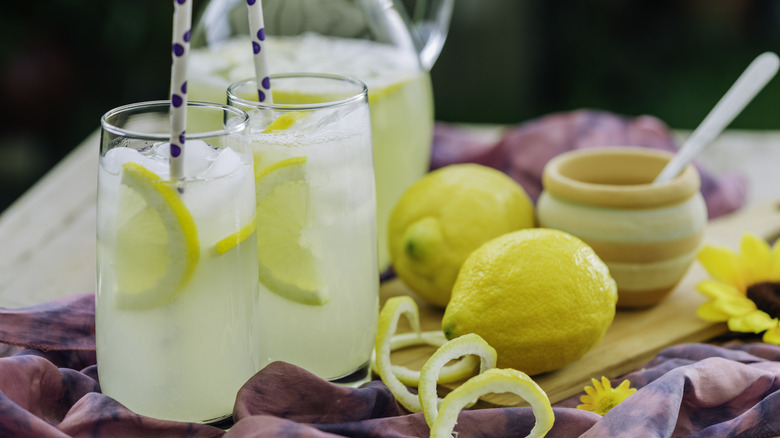The Key Difference Between Lemonade And Citron Pressé
Lemons and sugar go together like peanut butter and jelly. And sweet, cold lemonade is as refreshing as it is versatile — you can spike it, elevate it with spices, or even whip it to make a brunch or backyard barbecue that much tastier. Travel across the pond, and you'll find a very similar beverage served in French cafes but with a very different name: citron pressé. So are they the same or different?
The latter is just as refreshing, and both beverages are made with lemons and a sweetener. You can use a pitcher for serving both, and you can easily vary the two recipes to suit your tastebuds. But if you're inclined to sample the French version, there are a few key differences between these two that you'll notice right off the bat — in fact, one will be obvious before you even taste your first glass of citron pressé. So, if you're deciding which drink to make your go-to beverage this summer, you'll want to keep these distinctions in mind.
What is lemonade?
If you grew up in the U.S., you likely know what's included in a simple, classic lemonade recipe. You'll need lemons, of course, so you can extract all that lip-puckering juice, along with sugar and water. Some recipes swap out the sugar with simple syrup, or another liquid sweetener like honey or agave. But essentially, you'll just want those three elements in there: sour lemon juice, something sugary, and water to dilute everything.
Lemonade dates at least back to the 12th century, meaning it wasn't originally an American drink. It may have initially been an Arabic beverage, which we can glean from records of an ancient recipe with lemons, spices, and herbs. While it was likely meant to be a healing concoction back then, by the time it made its way to France and England in the 17th century, it was consumed for enjoyment as well.
Some of these early European recipes included sparkling water and honey, instead of the classic water and sugar we see now. Because of the fizzy water in the former, the drink was deemed a soda. As a result, the Compagnie de Limonadiers came to life in Paris, which secured a monopoly on lemonade and sold it around the city. It wasn't until 1824 that the first record of the drink popped up in the U.S., but this version involved egg whites — still a far cry from what we consume today.
What is citron pressé?
As mentioned above, citron pressé is very similar to lemonade. It's a cooling beverage perfect for a hot summer day, and it's made with lemon juice, a sweetener, and water. The term "citron pressé" essentially translates to "pressed lemon" in English, but a citron is not a lemon — it's its own fruit. Although both fruits fall under the citrus category, a citron barely yields any juice. So, in the context of the phrase citron pressé, we're referring to a beverage made with lemons.
This specific citrusy creation may have made its debut around the 1910s, as this is the decade we see the first record of the phrase. While we know that sparkling water was a classic addition to lemon juice in Europe back in the 17th century, that particular drink may have grown up to be limonade, which typically has a fizzy element. Citron pressé, on the other hand, became a staple in cafe culture in Paris. The drink is popular throughout France, but it has also traveled to other European countries like England — to the point where in today's world, visitors to France may order it more often than natives.
Lemonade is a quick and refreshing drink for cooling down
The process for making lemonade is simple. First you squeeze your lemons to extract all that sour liquid — or not, if you're using bottled juice. Then you combine all your ingredients together. If you're using granulated sugar, you may want to heat it with some water over the stove until it dissolves, at which point you have a simple syrup that you can stir into your pitcher. If you're using a liquid sweetener (like agave), you can just incorporate it as-is. Once everything has been combined, lemonade is generally chilled in the fridge (or mixed with ice, although this will dilute the drink) until it's served as one cohesive creation. It's often garnished with lemon slices or sprigs of herbs like lavender, then poured into glasses for individual servings.
If you don't want to bother making your own from scratch, you can buy a mix or jug from the store, and plenty of alcoholic beverages (like White Claw's hard lemonade) are adapted from the original recipe as well. There is a plethora of variations out there, such as pink, watermelon mint, and strawberry. Brands like Starbucks and Panera have jazzed up the drink with spices and caffeine, and it's often incorporated with other liquids to make classic beverages like the Arnold Palmer. Culturally speaking, no summer in the U.S. would be complete without the kids on your block setting up a lemonade stand as their first official business.
Take your sweet time with citron pressé
The biggest difference between lemonade and citron pressé comes down to how the latter is made and served. If you order it at a French cafe, you won't receive a pre-made drink — you'll get a tray with all the ingredients separated out, which is why many call it deconstructed lemonade. The beauty of this serving method is that you can make your own drink at your table, customizing it to your exact taste preferences. If you've ever tried lemonade that was too sweet, sour, or watery for your liking, then citron pressé may be the drink for you.
On the tray, you'll typically see separate containers of lemon juice, simple syrup, cold water, and ice — along with empty glasses. And there will usually be syrup instead of plain sugar, since the granulated stuff won't easily dissolve in your glass at the table. Sometimes you'll get full sugar cubes, and sometimes the glasses will already have ice in them. From there, you can build your ideal citrusy beverage, stirring, tasting, and adding as you go.
As with many European dining experiences, drinking citron pressé is meant to be a ritual, ideally enjoyed outside on a warm summer day. Beyond customizing ingredient ratios, there's not a ton of room for variety here, but there are similar beverages involving different fruits, such as orange or grapefruit pressé. If you want the closest flavor to lemonade, however, go for the classic citron version.




